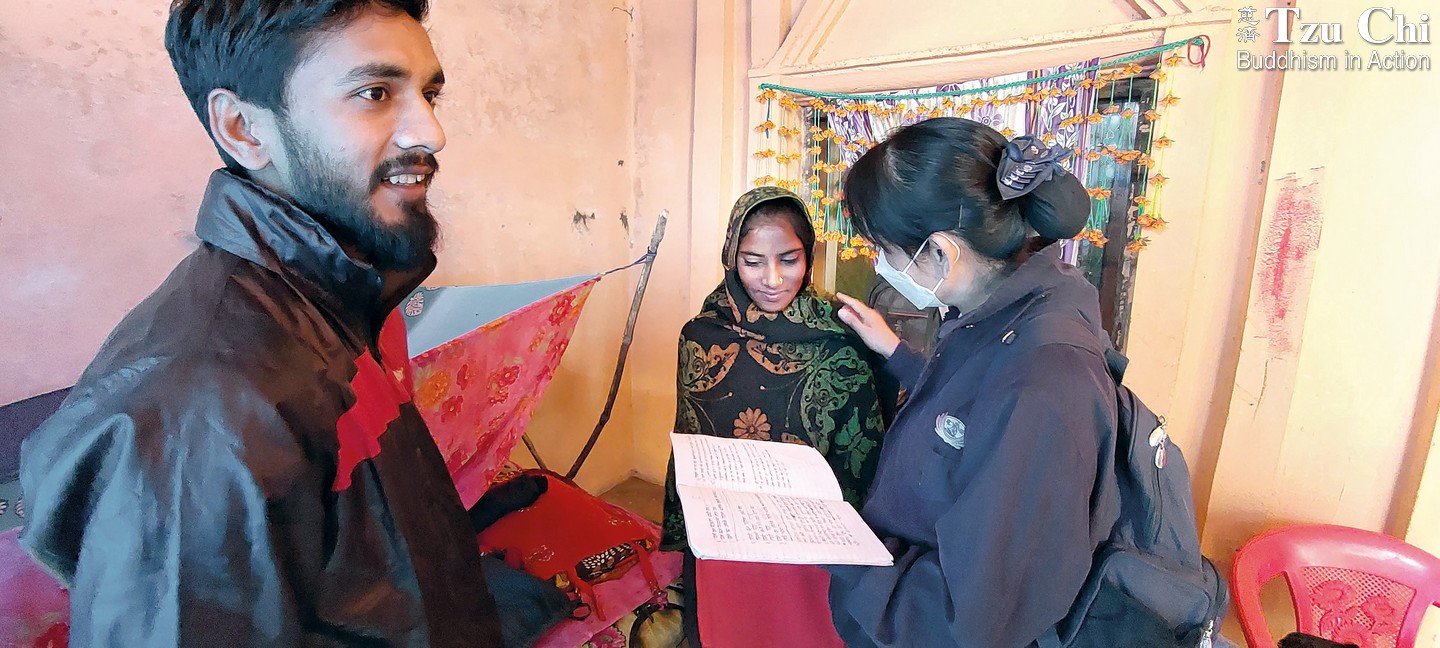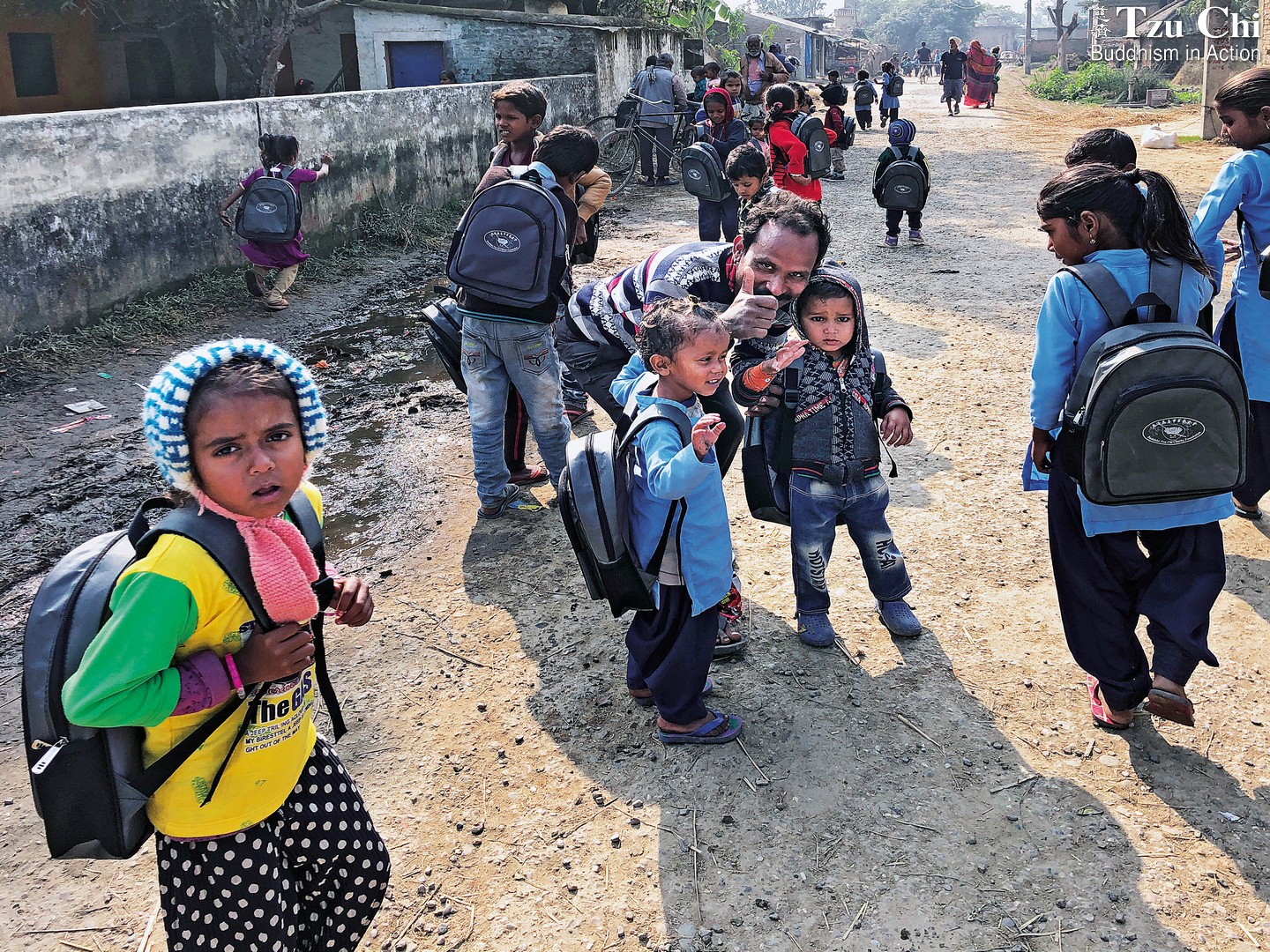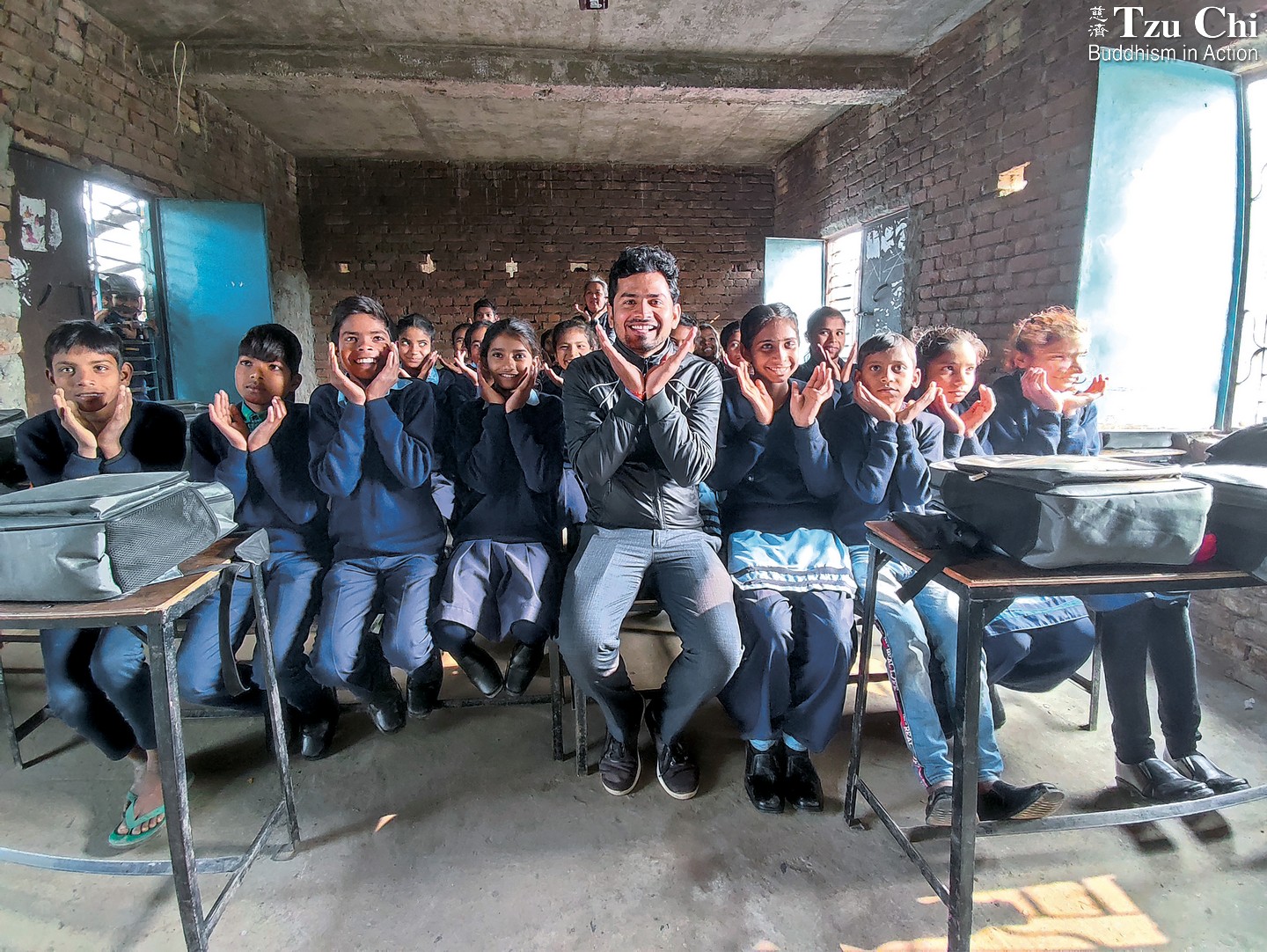By Cheah Chen Yee and Cecelia GC Ong
Translated by Wu Hsiao-ting
When Tzu Chi volunteers learned that 34 students had stopped attending Shree Gautam Buddha Lower Secondary School, they decided to do something about it. They visited each student’s household and eventually convinced five families to let their children return to school.

During a visit to her home, Tzu Chi volunteers extend care and support to a former student who has returned to Shree Gautam Buddha Lower Secondary School. They also inquired about her sick father during their visit.
Li Guo Xiang
Nepal offers families and students a free education for ten years, and the government’s emphasis on education in recent years has resulted in a significant increase in student enrollment and the number of schools at all levels. Despite such gains, the withdrawal rate remains high and the rate of advancement to higher education is low.
Shree Gautam Buddha Lower Secondary School, located on the main road in the village of Kewtaliya, Lumbini, provides education from early childhood to grade seven. When Tzu Chi volunteers learned that 34 of the school’s 319 students had ceased attending, they decided to visit each family to persuade them to let their children return to school.
Volunteers received a list of the students no longer attending from Principal Manoj Kumar Yadav. Then, beginning on November 14, 2022, they began visiting the students and their families. Venturing into the countryside, the volunteers passed endless rice paddies and observed villagers hard at work in the fields. They passed under melon trellises and walked by cattle pens, and though there were no doorplates in the rural area to guide them, enthusiastic children kindly showed them the way. Once they located the students and their families, they earnestly explained the importance of education to the parents with the help of translation volunteers.
Although public schools do not charge tuition, the costs of textbooks and school supplies make it hard for many families to keep their children in school. They just can’t afford it. Some parents told the visiting volunteers that they wanted their children to receive a good education, but the reality was that they didn’t even know where their next meal was coming from. There are other factors that keep kids out of school too. Local cultural norms prioritize sons over daughters, so household chores are often shouldered by girls, leaving them with fewer opportunities for education. Additionally, some children have to help with farm work during busy seasons, which takes precedence over going to school.
After discovering the difficulties faced by the families, the volunteers immediately provided them with food and other necessities—either on the same day as their visit or the following day. Such actions deeply touched the parents.
Israwati was a student that had been fortunate enough to complete seven years of education, but needed to travel to another village to attend a higher school. Sadly, she had no means of transportation to do so. And that might not have been the only obstacle she faced in continuing her education. Another reason many girls in the village don’t further their education after graduating from elementary school is that their parents are concerned about them leaving the village at such a young and attractive age. Other conservative traditions discourage many girls from venturing out of the village and pursuing their aspirations.
Volunteers asked Israwati if she could ride to school on her own if she had a bicycle. She looked at the volunteers but didn’t answer. Israwati’s sister-in-law emerged from a room with a child in her arms and said to the volunteers: “We’ll let her go to school.”
The volunteers learned through a translator that although Israwati had completed elementary school and could understand the Nepali language, she was unable to respond in kind. When they asked her if she had any aspirations, she looked bewildered. Her sister-in-law answered again in her stead: “Children here do not have their own ideas. There is no point in asking.”
After visiting all the families on the list, the volunteers successfully convinced five of them to allow their children to resume their education. On November 27, volunteers visited Shree Gautam Buddha Lower Secondary School and checked on the students who had returned to school. They also conducted additional home visits and expressed admiration and gratitude to the parents who had agreed to let their children go back to school. One mother expressed that she was deeply moved when she saw the volunteers, who were not related to them and came from outside of Nepal, caring about their children’s education. As a result, she was even more determined to support her daughter in continuing her studies.

Preschool students at Shree Gautam Buddha Lower Secondary School return home after receiving schoolbags and stationery from Tzu Chi.
Goh Lam Kia
Future prospects limited
Due to a conservative environment, cultural constraints, and language barriers, girls in the local village are often ignorant of the outside world, even unaware that they can take charge of their own future.
Volunteer Aw Kwai Wan, from Malaysia, discovered during her home visits that some parents themselves had not received an education and did not understand how education could bring positive changes. Girls also tended to accept the societal notion that males were more valuable than females. Moreover, they were unaware that they could chart their own life courses. Many simply followed in the footsteps of previous generations, getting married at a young age and starting families soon thereafter, perpetuating the same cycle from one generation to the next. “They are unable to continue their education after completing elementary school, limiting their future prospects,” said Aw. “Burdened with the responsibility of caring for their younger siblings, their smiles fade away. I hope Tzu Chi volunteers can bring back their smiles.”
Some of the children whose parents had agreed to let them return to school had not been attending for a long time. However, they couldn’t be placed back in a grade based on their age but instead had to resume their education from the year they had originally stopped attending. One of the children, for example, was already 16 years old but was re-enrolled in class with 11- or 12-year-olds. Volunteers tried to make things easier for her by talking to her classmates beforehand: “This older sister is going to study with you. Let’s work together to help make her experience in school better, okay?”
On December 1, volunteers accompanied Amrita Yadav home from school. She was one of the children who had resumed her studies. While on their way, the volunteers saw other students walking home while holding the hands of or carrying their younger siblings on their backs. Principal Manoj Kumar Yadav explained to the volunteers that some students in his school had no choice but to bring their younger siblings into the classrooms with them. In comparison, using a plastic bag as a schoolbag or going to school barefoot was no big deal. At least those students could focus on their studies in class without being distracted by a younger sibling.
The setting sun cast a long shadow of Amrita, making her look even taller than the other children. The girl had stopped going to school a year before at her mother’s request, to help with household chores. She came from a family of seven children. Her father had gone to work in India to pay off debts incurred from preparing dowries for his three daughters. Amrita’s younger brother Raja, who was 13 years old, attended a private school that cost 400 Nepalese rupees (US$3.0) per month. Their family had fallen several months behind in paying the tuition.
Amrita’s home was constructed half and half with bricks and clay. The volunteers met her 25-year-old elder sister while there. She had two kids herself, with her older son being five years old. Amrita did her homework in the front yard every day after school. She told the volunteers that she would make the most of the opportunity to attend school. Her dream was to become a doctor.
The principal told the volunteers that girls leaving school and child marriages were common in the village. “Though only a handful of students have returned to school as a result of your efforts, I’m happy and inspired, feeling empowered,” he said. “With Tzu Chi’s support, Amrita will definitely be able to achieve her dream.”

Tzu Chi volunteers shared Jing Si aphorisms by Dharma Master Cheng Yen with students after a distribution at Shree Gautam Buddha Lower Secondary School. This photo shows students having fun during the activity.
Lee Lay Sim
Tree leaves as spoons
It happened to be lunch break when volunteers arrived at the school for a visit on November 28. They noticed that some students were packing a portion of their lunch to take home and share with their siblings. The school administration didn’t restrict the amount of food for each student. Instead, they cooked more food if there wasn’t enough to go around. But what really surprised the volunteers was that some students had torn pages from their notebooks to wrap up the food they were taking home. They quickly arranged for a donation of bowls with lids to the school to address the situation.
During a subsequent visit to the school, during which hot milk soup was being served, they were astonished to see some children using tree leaves as spoons. The volunteers regretted they had not thought to provide spoons with the bowls. Without delay, they made another trip to the school to deliver spoons.
Volunteers returned again to the school on December 8 to distribute schoolbags, stationery, and other items to nearly 300 students. Some preschool students arrived at the distribution holding hands with their peers, while others came alone, very independent for their age. Older preschool students took on the responsibility of looking after the younger ones, keeping them close by and patiently awaiting the teacher’s instructions.
The volunteers were sad to see many children wearing thin clothing as they felt their cold hands. The school principal explained that with the items distributed on this day, all the children would finally be able to wear shoes to school. He added that their shabby attire wasn’t because they weren’t well loved, but rather that many parents simply couldn’t afford the expense.
After the distribution, the students returned to their classrooms. Senior students showed particular interest in the Nepalese-English dictionaries they had received, because the dictionaries would provide them with an extra opportunity to learn English. Younger students, on the other hand, were fascinated by the items inside the pencil cases. They took each item out to examine it and then carefully put it back in the case. During this time, one student approached a volunteer with a ruler in hand. With the help of a translator, the volunteer learned that the student had found an extra ruler inside his pencil case and wanted to return it.
Every time volunteers visited a local village or school in Lumbini, they felt like toddlers learning to walk. Every new experience enriched their personal growth. They broadened their horizons while fulfilling their aspirations of serving others. As they learned from their experiences, they sincerely hoped that their efforts to improve the lives of local people sowed seeds of love and brought light to those in need.



